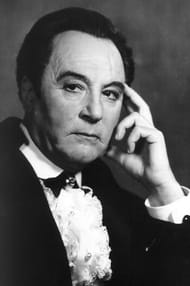

Vladimir Kenigson
Vladimir Kenigson was born on October 25 (November 7), 1907, in the family of attorney Vladimir Petrovich Kenigson in Simferopol. Swede by descent. In 1925 he graduated from the studio at the Crimean Drama Theater (now the Crimean Academic Russian Drama Theater named after A. M. Gorky) in Simferopol and was accepted as an intern in the company, from 1927 to 1928 and from 1933 to 1934 - an actor of this theater. In 1928-1942 (intermittently) - actor of the Dnepropetrovsk Theater of Russian Drama. M. Gorky (now the Dnipro Academic Theater of Drama and Comedy). In the years 1930-1931 - actor of the First Mobile Theater of the Ukrainian SSR (Sumy, Kherson, Vinnitsa). In 1934–1935 - an actor of the Samara Drama Theater (now the Samara Drama Theater named after M. Gorky). Since 1941 - in the evacuation of the Dnepropetrovsk Theater of Russian Drama. M. Gorky in Barnaul. In 1942 the Chamber Theater was placed in this city under the direction of A. Ya. Tairov from Moscow. The actor addressed A. Ya. Tairov with a letter in which he wrote about his desire to join the troupe of his theater and invited him to watch performances with his participation. According to the memoirs of the actor of the Chamber Theater Yu. O. Khmelnitsky, Vladimir played “convincingly, professionally” in the performance - and was soon accepted into the troupe of the Chamber Theater. According to Yu.O. Khmelnitsky, Vladimir “was not only a good actor, but also a very pleasant, sociable person.” He worked in the troupe until 1949, was the stage partner of the leading theater actress A. G. Koonen, played with her in the performances of Madame Bovary by G. Flaubert (Rodolph) and Guilty Without Guilt by A. N. Ostrovsky (Neznamov) . In 1949, M. E. Chiaureli's film “The Fall of Berlin” was released on screen, in which the actor played the role of a Nazi general Krebs. It was said that JV Stalin was delighted with the actor’s game in this film, saying that this is exactly how the enemies should be portrayed. For this film, together with the director and some other actors, in 1950 received the Stalin Prize in Literature and Art. Since 1949 (with a break) - the actor of the Maly Theater: on the advice of A. Ya. Tairov, he entered after the Chamber Theater was closed in 1949. From the very first steps on the stage of the theater, he occupied a leading position in the troupe. In 1950-1951 - actor of the Lenin Komsomol Theater (now Lenkom). In addition to film roles, he worked a lot on radio, dubbing cartoons and foreign films. He was chairman of the co-operative of the Maly Theater workers in the village of Valentinovka near Moscow. Died November 17, 1986 in Moscow. He was buried at the Vagankovskoye cemetery, at the 58th station, next to his son-in-law A. S. Eybozhenko.
Olvass tovább